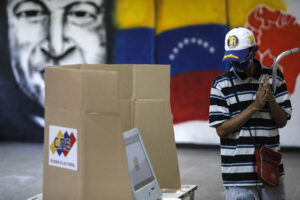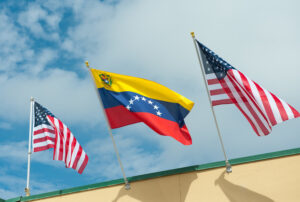Her Excellency María Ángela Holguín
Minister of Foreign Affairs of Colombia
His Excellency Mauro Vieira
Minister of Foreign Affairs of Brazil
His Excellency Ricardo Patiño
Minister of Foreign Affairs of Ecuador
4th March 2015
Re: Announcement of the new mission of UNASUR foreign ministers to Venezuela
Your Excellencies,
The signatories to this letter welcome the announcement[i] by the Secretary General of UNASUR (Union of South American Nations), Mr. Ernesto Samper, that the Foreign Ministers of Brazil, Colombia, and Ecuador will make a return visit to Venezuela in the coming days.
We are concerned about the rising tensions in recent days following the arrest of the mayor of Caracas, Mr. Antonio Ledezma, and the fatal shooting by police of 14-year-old student Kluivert Ferney Roa Nuñez during a demonstration on February 24, 2015.
The signatories to this letter deeply regret the student’s death and make an appeal that this and other abuses committed by the state during the suppression of protests in recent months are investigated and the perpetrators are held accountable. It is essential that the violence surrounding last year’s protests—which resulted in 43 deaths and more than 3,300 people arrested between February and June 2014—is not repeated.[ii]
We hope that the announced UNASUR mission may contribute to the full respect for human rights and the restoration of dialogue between political actors and all sectors of Venezuelan society.In this situation, the signatories to this letter respectfully request that the announced Mission of Foreign Ministers of UNASUR that goes to Venezuela:
1. Makes a public and emphatic call for the full respect for human rights and the resumption of dialogue.
2. Meets with Venezuelan political actors and social groups during their stay in the country.
3. Presents, after the conclusion of the visit, a list of concrete and public recommendations followed by a Work Plan with actions that UNASUR will carry out during the months leading up to the parliamentary elections to be held in Venezuela this year. The publication of the recommendations and actions identified in the Plan will bring legitimacy to the work of UNASUR, as well as allow civil society in Venezuela and throughout the region to objectively monitor the work of mediation and collaborate with the work being undertaken.
We request that the following items be included in a Work Plan subsequent to the visit:
• GUARANTEE OF THE FREEDOM OF ASSEMBLY, INCLUDING THE PROHIBITION OF THE ABUSIVE USE OF FORCE: The mission of foreign ministers of UNASUR must request a review of the decision of the Ministry of Defense No. 008610 of January 2015,[iii] which authorized the use of the Armed Forces of Venezuela in responding to protests. According to the Support Network for Justice and Peace (Red de Apoyo por la Justicia y la Paz),[iv] the resolution “violates Article 329 of the Constitution of the Bolivarian Republic of Venezuela as it gives public security functions to the Army, Air Force, and Navy.” The Forum for Life (Foro por la Vida) presented a similar criticism,[v] stating that the measure “departs from the international standard that only the police should be responsible for internal order; moreover, this is highlighted in a context of widespread crackdowns by troops of the Armed Forces in recent public demonstrations.”
• END OF ARBITRARY ARRESTS AND ABUSE OF PRE-TRIAL DETENTION: Call for the authorities to end the practices of arbitrary and pre-trial detention and release those who are imprisoned unjustly. We reiterate the concern expressed by the Inter-American Commission on Human Rights (IACHR)[vi] on the use of temporary detention against government critics. As the Commission stated on February 24, 2015, “pretrial detention must be the exception, not the rule, and must be applied only with the aim of protecting the proper goal of the procedures, namely where the person presents a flight risk or to prevent the obstruction of the investigations. In that regard, the Commission has stressed that the presumption of innocence can be considered to have been violated when a person facing criminal charges is subject to pretrial detention without proper justification, as in that case the detention becomes a punitive rather than precautionary measure, which is tantamount to anticipating a sentence. Moreover, pretrial detention should be used in accordance with the criteria of necessity and proportionality, and for a reasonable period of time.”
• STRENGTHENING THE INDEPENDENCE OF THE JUDICIARY:According to a report of the International Commission of Jurists (ICJ)[vii] in May 2014, 80 percent of judges in Venezuela are provisional.[viii] Countries committed to the democratic rule of law recognize judicial independence as one of the pillars of human rights. Therefore, the foreign ministers of the UNASUR mission should give priority to this issue during their visit and include new measures on this front.
• ROLE OF THE OMBUDSMAN: Urge the Ombudsman to play the role of mediator and guarantor of human rights without discrimination to any persons, as defined in the Venezuelan Constitution.
• COOPERATION WITH REGIONAL AND INTERNATIONAL HUMAN RIGHTS SYSTEMS: The UNASUR Mission should call on the Venezuelan government to permit the entry of the Special Rapporteurs of the United Nations Human Rights Council that have pending applications to visit the country. Another commitment that UNASUR should mediate is Venezuela’s return to the American Convention on Human Rights. Venezuela withdrew from the region’s main legal instrument in September 2012, leaving Venezuelans without access to the Inter-American Court of Human Rights.
We hope that the proposed items will be considered by the foreign ministers of UNASUR that make up the mission to Venezuela and be incorporated into the activities undertaken by them during and after their visit to the country.
The signatories to this letter are committed to the protection and promotion of human rights in Venezuela and hope to witness UNASUR action in restoring dialogue to find a democratic solution—never beyond constitutional limits—for the current situation in the country.
Sincerely,
1. Acción Solidaria en VIH/Sida (Venezuela)
2. Amnistía Internacional (International)
3. Asistencia Legal por los Derechos Humanos A.C. – ASILEGAL (Mexico)
4. Asociación Pro Derechos Humanos– APRODEH (Peru)
5. Asociación Venezolana de Organizaciones de Sociedad Civil – Sinergia (Venezuela)
6. Centro de Documentación en Derechos Humanos “Segundo Montes Mozo S.J.” – CSMM (Ecuador)
7. Centro de Estudios de Derecho, Justicia y Sociedad – Dejusticia (Colombia)
8. Centro de Políticas Públicas y Derechos Humanos – EQUIDAD (Peru)
9. Centro Nicaraguense de Derechos Humanos (Nicaragua)
10. Centro por la Justicia y el Derecho Internacional – CEJIL (Regional)
11. Centro Regional de Derechos Humanos y Justicia de Género – Corporación Humanas (Chile)
12. CIVILIS Derechos Humanos (Venezuela)
13. Coalición de Organizaciones por los Derechos a la Salud y la Vida – CODEVIDA (Venezuela)
14. Comisión Ecuménica de Derechos Humanos- CEDHU (Ecuador)
15. Comité de Am. Lat. y Caribe para la Defensa de los Derechos de las Mujeres-CLADEM (Regional)
16. Comité de Familiares de las Víctimas – COFAVIC (Venezuela)
17. Conectas Direitos Humanos (International)
18. Coordinadora Nacional de Derechos Humanos (Peru)
19. Defensa de Niñas y Niños Internacional – DNI (Costa Rica)
20. Espacio Publico (Venezuela)
21. Fundación Étnica Integral- FEI (República Dominicana)
22. Fundación para el Debido Proceso – DPLF (Regional)
23. Instituto de Estudios Comparados en Ciencias Penales de Guatemala – ICCPG (Guatemala)
24. Instituto de Estudios Legales y Sociales – IELSUR (Uruguay)
25. Instituto Internacional de Derecho y Sociedad – IIDS (Peru)
26. Movimiento Autónomo de Mujeres (Nicaragua)
27. Observatorio Venezolano de Prisiones (Venezuela)
28. Oficina Jurídica Para la Mujer de Cochabamba (Bolivia)
29. Paz y Esperanza (Peru)
30. Plataforma Interamericana de Derechos Humanos, Democracia y Desarrollo – PIDHDD (Regional)
31. Programa Venezolano de Educación-Acción en Derechos Humanos- PROVEA (Venezuela)
32. Sisma Mujer (Colombia)
33. Washington Office on Latin America- WOLA (Regional)
To download the letter in PDF, please click here.
[iii]Resolution “Rules on the performance of the Bolivarian National Armed Forces in maintaining public order, social peace, and peaceful coexistence in public meetings and demonstrations(Normas sobre la actuación de la Fuerza Armada Nacional Bolivariana en funciones de control del orden público, la paz social y la convivencia ciudadana en reuniones públicas y manifestaciones)”, published in Gaceta Oficial No. 40,589, January 27, 2015.
[iv]http://www.derechos.org.ve/2015/01/30/red-de-apoyo-por-la-justicia-y-la-paz-rechaza-la-aprobacion-de-la-resolucion-no-008610-por-parte-del-ministerio-del-poder-popular-para-la-defensa/
[v]http://www.derechos.org.ve/2015/01/30/foro-por-la-vida-armada-ejercito-y-aviacion-no-pueden-actuar-en-control-del-orden-publico/
[vii]http://www.icj.org/venezuela-weak-legal-system-threatens-democracy-and-human-rights-reforms-urgently-needed-new-report-says/
[viii]The organization says that “The majority of judges are appointed on temporary provisional terms and are susceptible to external pressures, since a Judicial Commission of the TSJ, characterized by clear political tendencies, can remove them at will. Furthermore, even the minority of judges who in theory enjoy security of tenure can in practice be suspended from office without any specific accusation or legal procedure having been initiated against them.”


